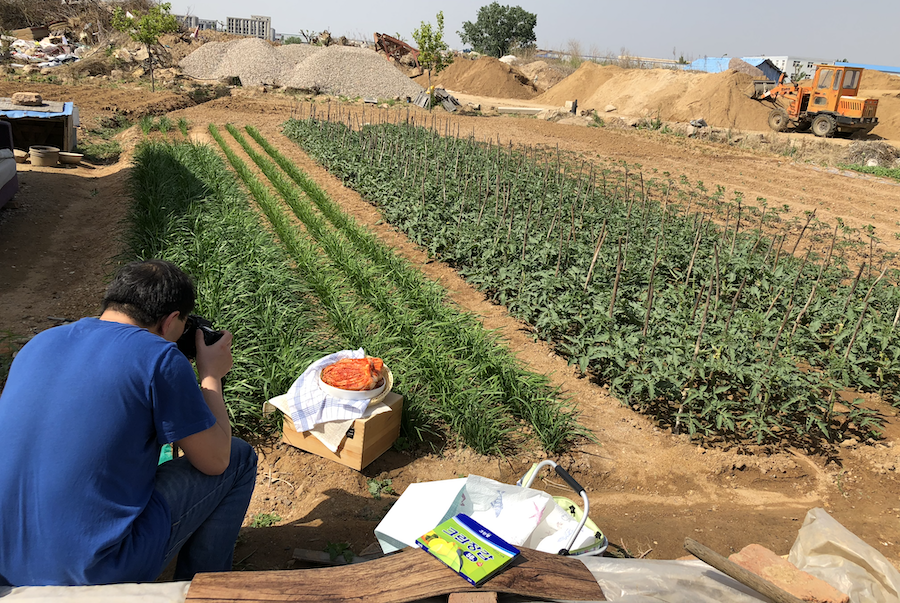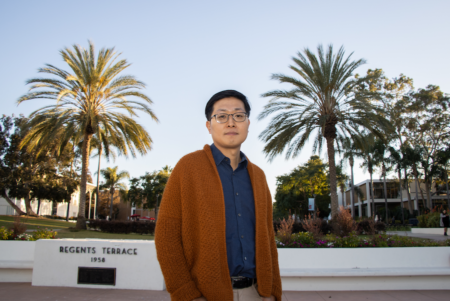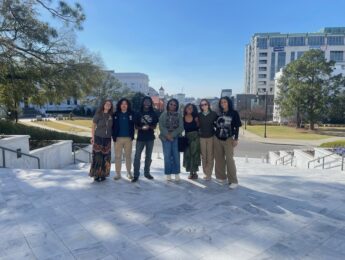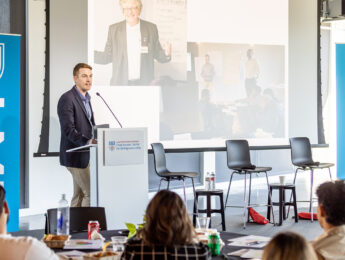
Heangjin Park, assistant professor of Asian and Asian American studies, is an ethnographer who brings an immersive approach to teaching and research to Loyola Marymount University. He is one of 11 new tenure-line faculty members in the LMU Bellarmine College of Liberal Arts.

As someone who has researched China and South Korea through extensive fieldwork, Park helps students explore the dynamic relationship between food, business, and nationalism in courses such as “Contemporary Asia” and “Food in Asia, Asia in Food.” In the Asian food course, students read historical, sociological, and anthropological literature while also conducting their own research on Asian food in L.A. “They are developing scavenger hunts in the neighborhoods they are studying, which would be excellent tools for introducing the history of Asian food and Asian neighborhoods in L.A. to a broader audience,” said Park.
For Park, food is a lens for understanding society and the intertwining of human and economic relationships. Growing up in South Korea, he loved books and films for their ability to evoke the mood and tone of society while expanding his knowledge of history and culture. In high school he studied Mandarin and found himself on a TV quiz show, which awarded him a trip to China. “The trip boosted my interest in Chinese society and culture, and more importantly, I made some good friends in China,” said Park.
Park planned to major in economics at Seoul National University, but he quickly realized that he was most interested in the people who make, deliver, and consume goods in a market economy. His parents needed a little convincing, but Park ultimately chose anthropology as his major and focused on the subdiscipline of economic anthropology. This allowed Park to study commodities, gifts, and markets while also deepening his interest in China.
In graduate school Park became particularly interested in the role food plays in reinforcing the strong economic ties between China and South Korea. He wanted to delve into South Koreans’ thoughts on “made-in-China” food products while also attempting to understand how Chinese peasants feel about South Korea. To do this he embarked on seven months of fieldwork in a small village in Northeast China that grew perilla and magnolia berry, which were not hugely popular in China but had greater market demands in South Korea.
He was also introduced to Chinese businesspeople who manufactured banchan, a South Korean vegetable side dish. “Made-in-China,” banchan is often depicted in South Korean media as a greedy, dirty business hurting South Korean rural communities, national economy, and cultural tradition. But Park had opportunities to hear individual stories that illuminated the complexity of manufacturing and trading banchan across China. He learned how banchan manufacturers and traders adapted or challenged South Koreans’ perceptions of China and China-made foods.
“Through my interactions with them, I started thinking about the meanings of Korea and China, how people categorize commodities and goods based on nationality, and what this tells us about nationalism in East Asia,” said Park.
Wanting to understand more deeply what shaped the different perspectives of entrepreneurs and workers in China and Korea, Park enrolled at University of Chicago, completing a Ph.D. in anthropology. His dissertation “Manufacturing ‘Korea’ in China: The Coproduction of Commodity Value and Nationalist Imaginaries in the Chinese Kimchi Industry,” is based on 13 months of fieldwork in a kimchi factory in Qingdao, China, where Park observed company operations while designing kimchi packaging and taking product photos.
“I started thinking about the meanings of Korea and China, how people categorize commodities and goods based on nationality, and what this tells us about nationalism in East Asia,” said Park.
“I realized my role was to provide feedback as a South Korean on whether the images were ‘Korean’ enough,” said Park. “The design work inspired me to think further about how the meanings of Korea were interpreted by businesspeople and articulated in commodities like kimchi.”
During this time, Park and his wife welcomed their son, Linus, and they lived in the same room the owners of the kimchi factory had stayed with their family while starting the business. Park juggled fieldwork and parenting by bringing his son to the office on a regular basis. The presence of a young child was well accepted by office and production line workers who played with Linus and shared valuable parental advice with Park. Park quipped, “I always say it took a factory to raise him.”
Park’s experience of working, researching, and parenting led him to contemplate the relationship between business and family. “I started questioning: how do people plan and prepare for the future in their work and family, and how does their understanding of Korea and China shape their plans? So, in a way, my son Linus did the fieldwork with me. It was our family project,” said Park.
Park’s strong interests in film and photography can also be seen in his work. He incorporates multimedia elements into his research and publications as a way to explore people’s thoughts, experiences, and feelings through aesthetic details. “I look forward to doing more ethnographic fieldwork in China, South Korea, and Los Angeles with my camera, and presenting my research with engaging images and video,” said Park.
As an economic anthropologist who loves food, film, and sports, Park is thrilled to be living in Los Angeles and teaching at LMU. “We have students from various ethnic, national, religious, socioeconomic, and cultural backgrounds, and our classroom conversations benefit from such diversity, helping us to develop unique insights into social issues collectively that we might not have come to individually,” said Park. “So as much as I offer my insights on Asian society, economy, and culture in the classes, my students push me to articulate why it is important to learn about these societies, how we should approach inequality and discrimination, and what we can do to make our world a better place.”
Park’s documentary film “Chejian: Living and Working between Vehicles,” on the homecoming trip of the kimchi factory workers in China















